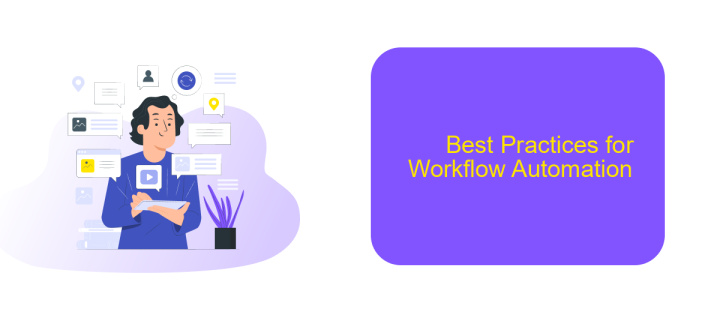Workflow Automation for Small Businesses
In today's fast-paced business environment, small businesses must leverage every advantage to stay competitive. Workflow automation offers a powerful solution to streamline operations, reduce manual tasks, and enhance productivity. By adopting automation tools, small businesses can focus on growth and innovation, rather than getting bogged down by routine processes. This article explores the benefits and implementation strategies of workflow automation for small enterprises.
Introduction
Workflow automation is a game-changer for small businesses, offering a way to streamline operations, reduce manual tasks, and improve overall efficiency. By automating repetitive processes, small businesses can free up valuable time and resources, allowing them to focus on growth and innovation.
- Increased productivity by automating routine tasks
- Improved accuracy and reduced human error
- Better resource management and cost savings
- Enhanced customer satisfaction through faster response times
One of the key tools for implementing workflow automation is ApiX-Drive, a service that facilitates seamless integration between various applications. With ApiX-Drive, small businesses can easily connect their CRM, email marketing, and other essential tools, ensuring a smooth and efficient workflow. By leveraging such services, small businesses can stay competitive and agile in an ever-evolving market landscape.
Benefits of Workflow Automation

Workflow automation offers a multitude of benefits for small businesses, significantly enhancing efficiency and productivity. By automating repetitive tasks, businesses can free up valuable time for employees to focus on more strategic activities. This not only reduces the risk of human error but also ensures that processes are carried out consistently and accurately. Additionally, automation can help streamline operations, leading to faster turnaround times and improved customer satisfaction.
Another key advantage of workflow automation is the ability to easily integrate various tools and platforms, creating a seamless operational environment. Services like ApiX-Drive facilitate the integration of different applications, allowing businesses to synchronize data and automate workflows without the need for complex coding. This ensures that all systems work harmoniously, providing real-time insights and enhancing overall decision-making. Ultimately, workflow automation empowers small businesses to operate more efficiently, reduce costs, and scale their operations effectively.
Tools and Software for Workflow Automation

Workflow automation can significantly enhance the efficiency of small businesses by streamlining routine tasks and reducing human error. A variety of tools and software are available to help businesses achieve this.
- Trello: A project management tool that helps organize tasks and projects with boards, lists, and cards.
- Zapier: Connects different apps and automates workflows by triggering actions between them.
- ApiX-Drive: Facilitates easy integration between various services and applications, allowing for seamless data transfer and automation.
- Slack: A communication platform that integrates with various tools to automate notifications and updates.
- Asana: Helps teams manage projects and tasks, with automation features to streamline workflow processes.
By leveraging these tools, small businesses can automate repetitive tasks, improve communication, and enhance overall productivity. Tools like ApiX-Drive are particularly useful for setting up integrations between different services, ensuring smooth and efficient operations. Investing in workflow automation software can lead to significant time savings and allow business owners to focus on more strategic activities.
Best Practices for Workflow Automation

Implementing workflow automation in small businesses can significantly enhance efficiency and reduce manual errors. To achieve the best results, it's crucial to follow best practices that ensure a smooth and effective automation process.
First, identify repetitive tasks that consume valuable time and resources. Prioritize these tasks for automation to maximize the impact. Additionally, choose tools and software that are user-friendly and scalable to accommodate future growth.
- Map out existing workflows to understand the process and identify bottlenecks.
- Choose reliable automation tools, such as ApiX-Drive, to integrate various applications seamlessly.
- Test automated workflows thoroughly before full implementation to avoid disruptions.
- Train employees on new systems to ensure smooth transitions and high adoption rates.
- Regularly review and optimize automated workflows to maintain efficiency.
By adhering to these best practices, small businesses can streamline operations, reduce costs, and focus more on strategic growth. Utilizing integration services like ApiX-Drive can further enhance the automation process by connecting disparate systems and ensuring data flows smoothly across platforms.
Conclusion
In conclusion, workflow automation offers a transformative opportunity for small businesses to streamline operations, reduce manual errors, and boost productivity. By automating repetitive tasks, businesses can free up valuable time and resources, allowing employees to focus on more strategic initiatives. Implementing automation tools doesn't have to be complex or costly; many solutions are designed to be user-friendly and scalable, making them accessible for businesses of all sizes.
Integrating various applications and services is crucial for a seamless workflow. Tools like ApiX-Drive enable businesses to easily connect different software platforms, ensuring data flows smoothly between them. This not only enhances efficiency but also provides a unified view of operations, facilitating better decision-making. By embracing workflow automation and leveraging integration services, small businesses can stay competitive and agile in an ever-evolving market.
FAQ
What is workflow automation and how can it benefit my small business?
How do I identify which tasks in my business can be automated?
What types of business processes are most commonly automated in small businesses?
How can I integrate different software tools to work together seamlessly?
Is it expensive to implement workflow automation in a small business?
Apix-Drive is a universal tool that will quickly streamline any workflow, freeing you from routine and possible financial losses. Try ApiX-Drive in action and see how useful it is for you personally. In the meantime, when you are setting up connections between systems, think about where you are investing your free time, because now you will have much more of it.

